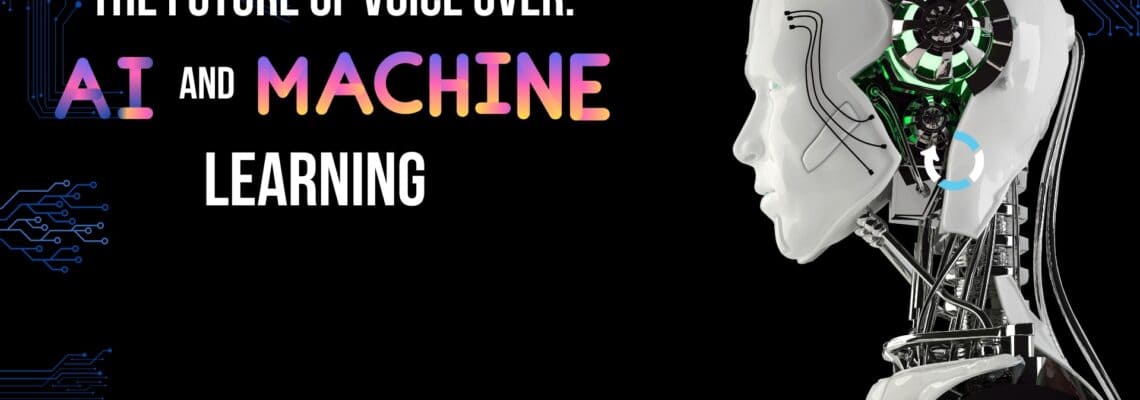
Have you ever wondered why ChatGPT is trending and why people fear it could be the Judgment Day or their job’s end? That’s because ChatGPT is an AI chatbot capable of understanding human language and generating human-like text. In other words, Artificial Intelligence is an exceptionally intelligent computer with solutions for every problem.
Admittedly, it does seem like a threat and raises concerns among industry employees, including the voice-over industry, who fear mass unemployment due to these technological innovations. The voice-over industry is constantly evolving, and the emergence of artificial intelligence (AI) and machine learning is one of the most significant changes in recent years. As AI technology advances, it is poised to revolutionize the voice-over industry in unimaginable ways. In this blog, we’ll explore the future of voice-over and the impact of AI and machine learning on the industry.
Improved Voice Quality
One of the most significant impacts of AI on the voice-over industry is improved voice quality. AI technology can analyze and enhance voice recordings, resulting in higher-quality audio that is more natural-sounding and engaging. This technology can also help to reduce background noise and other unwanted sounds, resulting in a cleaner and more professional final product.
AI Voices
AI voices are narrations produced via an AI voice generator that relies on machine learning to replicate high-quality, natural-sounding speech. These voices can be used in a variety of applications, including audiobooks, podcasts, and commercials. While AI voices are not yet perfect, they are improving rapidly, and many experts predict that they will become indistinguishable from human voices in the near future.
Read also: 5 Best Voice Over Software
Voice Assistants
Voice assistants are another area where AI and machine learning are having a significant impact. As voice assistants become more advanced, they are becoming more intuitive and responsive, making them an increasingly popular way for consumers to interact with technology. This trend is likely to continue in the coming years, with voice assistants becoming more integrated into our daily lives.
Natural Language Processing
Natural language processing (NLP) is another area where AI and machine learning are having a significant impact. NLP technology can analyze and understand human language, making it possible for voice assistants to respond to complex queries and commands. This technology is also being used in other applications, including customer service and chatbots.
Innovative Voice Applications
AI and machine learning are paving the way for new and exciting voice applications. Voice-enabled devices, such as smart speakers, are becoming increasingly prevalent in households. This trend opens up opportunities for voice actors to lend their voices to these devices, creating interactive and immersive experiences for users. From storytelling to interactive games, voice actors can bring characters and narratives to life in ways that were previously limited to traditional media formats.
Ethical Concerns and Challenges
Just like any new innovation, the introduction of AI brings both advantages and disadvantages. While it has bestowed upon us incredible advancements to explore and utilize, it has also sparked a plethora of ethical questions and presented its fair share of challenges along the way.
One of the concerns is the potential misuse of AI voices for fraudulent purposes, such as deepfake technology. The ability to generate realistic voices could lead to impersonations or false representations, which can have serious implications.
Another challenge is the need to maintain diversity and inclusivity in the voice-over industry. As AI voices become more prevalent, there is a risk of homogenization of voices, potentially reducing opportunities for underrepresented groups. It is essential for industry stakeholders to actively promote diversity and ensure that AI technologies are designed and trained with inclusive data sets to avoid perpetuating biases.
Additionally, as AI technology continues to evolve, it is crucial to establish guidelines and regulations to govern its use in the voice-over industry. This includes issues such as intellectual property rights, privacy concerns, and transparency in disclosing AI-generated content to consumers.
So, to address the anticipated question after taking into account the ethics and challenges, IS IT A THREAT ?
It sounds unfortunate but as AI voices become more advanced, they may replace human voice actors in some applications, resulting in job losses and a shift in the industry. However, many experts believe that AI technology will complement human voice actors rather than replace them, resulting in new opportunities and a more diverse industry.
As AI technology becomes more advanced, there will be a growing demand for voice actors who can work with this technology and create high-quality content that engages and entertains audiences. Additionally, AI technology is creating new applications for voice-over content, including virtual assistants, chatbots, and e-learning.
The future of voice-over is closely tied to the development of AI and machine learning technology. As the industry continues to evolve, voice actors and service providers need to stay up-to-date with the latest trends and technologies and embrace new opportunities for growth and innovation. By staying adaptable and open-minded, industry professionals can navigate this evolving landscape with confidence.

